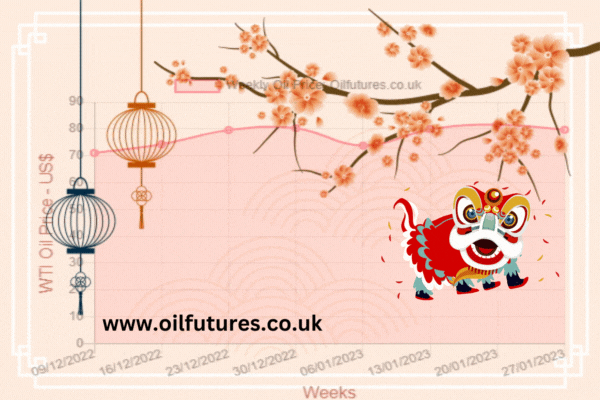The investors of the crude oil markets managed to breathe a sigh of relief last week as the prices of the two benchmarks, WTI and Brent, remained fairly static, despite the unfavourable headwinds that blow across the markets.
The price of LNG, liquified natural gas, for instance, fell sharply and shows no sign of recovery, as the warmer weather prevails in the northern hemisphere, with just a month left before the end of winter. In addition, the US crude stocks keeps building, reflecting a weak demand. The hemorrhage of jobs in their thousands in the technological sector, meanwhile, hardly helps counteracting the negative sentiment.
Against this backdrop, analysts attribute the positive sentiment that we saw last week to the perceived high economic activities in China.
The Chinese are celebrating their Spring Festival, also known as the Chinese New Year, the most important cultural event that dates back to the ancient times in full gear. They welcome the arrival of spring at the end of winter in style, an opportunity for the families to gather and celebrate, which in turn contributing to mass movement of people - and vehicles too - across the vast country; the Chinese data shows that people made 308 million trips locally during the week-long festive period.
As far as the crude oil markets are concerned, analysts saw it as a catalyst to shore up the shaky fuel demand: on one hand, China is still an economic power house and a force to be reckoned with - the world's second largest economy; on the other hand, it appears to be the only place that can trigger off a spike in demand with heightened economic activity, as it is the need of the hour - despite it being eclipsed by the frequent outbreaks of Covid-19.
For the past three years, the Chinese could not celebrate the festival due to Covid-19 restrictions. China, however, relaxed the measures in December last year that in turn paved the way for the celebrations to go ahead this year; as far as those who live in China are concerned, it appeared to have done the trick, as people joined en masse to celebrate the event.
Understandably, the Chinese media is upbeat too: it believes the accelerated economic activities will inevitably lead to lifting up the canopy of gloom that has been covering the global economy since the pandemic: it is, however, easier said than done; the world is polarized more than ever before the pandemic, with China occupying a significant position along the fault line.
As the festive period drew to a close, meanwhile, the price of crude oil fell slightly on Friday and the price pendulum was back in the gloomy territory: the investors are still nervous about what China calls, the optimized Covid-19 response, as the government data on the number of infections and deaths is hard to come by. China defended the delay on the ground of collecting data across the country due to logistical problems.
It is no secret that the global economy as a whole is down on a slippery road; the World Bank already revised its own GDP growth, down from 3% to 1.7% for the year 2023. In this context, analysts and investors pin their hopes on China, assuming it will achieve an irreversible recovery in the First Quarter of this year, signs of something yet to be seen.
If China can pull a surprise, it will certainly boost the markets in general and crude markets in particular, as it is the world' s largest importer of crude oil. There have been a quite a few false dawns in the recent past, though.
A notable feature of the Chinese festival is the choice of colour red and dances involving lions and dragons. They are supposed to bring good luck while keeping the evil spirits at bay.
We can only hope the good luck that the Chinese attract with so much fanfare in week-long celebrations will permeate beyond the Great Wall. That is a collective global yearning, indeed.







